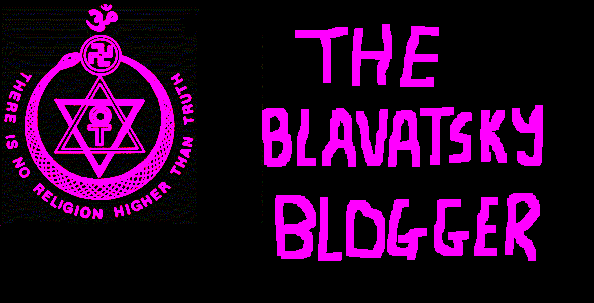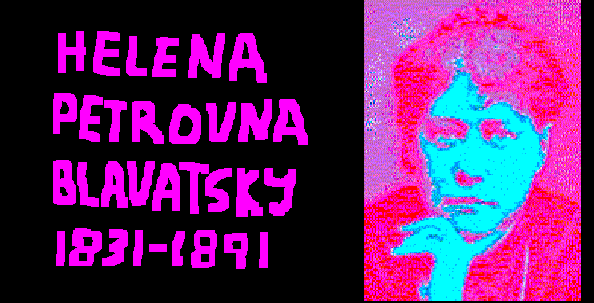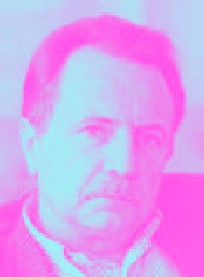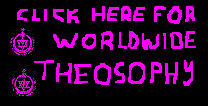Blavatsky Blogger

Taking Theosophical
ideas
into the 21st
century

The
intended outcome is the
BENEFIT
OF MANKIND
But
This
is a disturbing mirror
image of Esoteric Thinking.
********************
Jules
Regis Debray turned the idea of
Revolution
into an Esoteric Doctrine
and the ideal revolutionary into a warrior
monk who does not pursue material gain,
power or adhere to a political ideology.
His
ideas have influenced South American
terrorist movements with some devastating
effects.
***********************
H
P Blavatsky was prepared to engage in armed struggle
against oppression when she fought as a partisan
alongside Garibaldi at the
She
also supported armed struggles by nationalist
groups
in the Balkans during the 1870s.
Despite
this participation in and support for
armed
struggle, the development of H P Blavatsky’s
Esoteric
Ideas were to leave a peaceful legacy.
**********************
This
entry examines how H P Blavatsky
and Jules Regis Debray mirror each other
with
one using Esoteric Thought for peace,
harmony and understanding while
the other used it for conflict and violence.
Posted

Jules Régis Debray
Jules Régis Debray (Born 1941) was a French urban guerilla who
operated in
His ideas
on revolution are laid out in his book “Revolution in the Revolution” published
in 1967
_________________
He believed that guerilla forces should be led by itinerant
career revolutionaries who need not be native of the country in which they were
fighting. These were not mercenaries as they would have to be in sympathy with
aims of the revolution in which they fighting.
Even though he was without religious affiliations or background,
he saw the struggle against oppression a equal to a
sacred cause. This required a zealot for whom the struggle was an end in itself.
A cult of revolution if not a religion.
He maintained that intellectuals were essential to the success
of any cause but no use in actual armed struggle as they would be troubled by
conscience. This acknowledgement of the need for intellectual thought is his
only concession to hearts and minds.
One key and very elitist attitude was that he regarded the urban
working class including communist party members as inherently conservative and
therefore an obstacle to revolution, although not the ultimate enemy.
He promoted the disturbing idea that building a guerilla
movement was more important than building a revolutionary political party and
this approach was adopted by groups in
I believe Debray must have been influenced by Nietzsche’s “Thus
Spake Zarathustra” in which Zarathustra tries to teach the crowd in the town
and the people just throw stones at him. He then retreats to a remote cave and
teaches a small esoteric group, which will eventually spread his teaching.
Debray believed that living in the town would corrupt a
revolutionary and that small groups should initially operate in remote rural
areas and then build up.
Debray’s
ideal revolutionary is similar to Nietzsche’s “Overman”
in that he is a member of an elite group and operates outside the rules of
society.
Pursuit of material gain plays no part in Debray’s
philosophy which operates independently of any specific political ideology This is a philosophy of pure revolution. However, I would
expect that the revolutionary would have to become emotionally involved in the
revolution in order to stay with it.
This is a philosophy of pure revolution which finishes at the
point of seizing power, the point at which the career revolutionary moves on.
The pursuit of power is therefore not even an option.
Certainly the ideal revolutionary must develop a level of non-attachment,
retaining motivation while restraining the desire principle.
There is no mention in Debray’s
philosophy of an honourable death for a cause. It
seems to be a given that the risk of death is taken but acts such as suicide
bombing are outside his remit.
A parallel can be drawn between Debray’s
revolutionary and itinerant activists seen during industrial disputes in the
There is also a similarity with Joseph Conrad’s sailor in “Heart
of Darkness” to whom visiting foreign lands means little, the sea is the thing.
H P Blavatsky’s Military Career
H P Blavatsky fought as a partisan for
Garibaldi against the combined forces of
Although this indicates that she was a
woman of action and was just an intellectual or theoretical agent of change it
appears to me just an adventure in her life and not indicator that militancy
figured in her philosophy beyond a belief that it is sometimes acceptable to
use force against oppression.
___________________
Where H P Blavatsky and Debray seem to
mirror each other is that whereas H P Blavatsky aimed at identifying the
essential truths behind every religion, Debray aimed at identifying the essential
components that must be contained in every armed struggle.
The Theosophist transcends
religion
The Revolutionary
transcend revolution
A Theosophist can strip a religious
tradition down from its outward identity to its basic concepts. This can lead
to spiritual breakthroughs but sometimes it produces a person who is very
religious but too intellectual to have a specific religion. I must make the
point here that I believe that religion can function at many levels and is
independent of spiritual progress.
Debray’s
theories of revolution and of the ideal revolutionary operate independently of ideology
and can produce a professional revolutionary who can operate in, and feel
affinity with, any revolution but without actually having a cause of his own.
______________________
The Blavatsky
Blogger
Taking Theosophical
ideas
into the 21st
century
__________________________
Postings
to this Website reflect
the
views of The Blavatsky Blogger.
Please
don’t go looking for anyone else.

